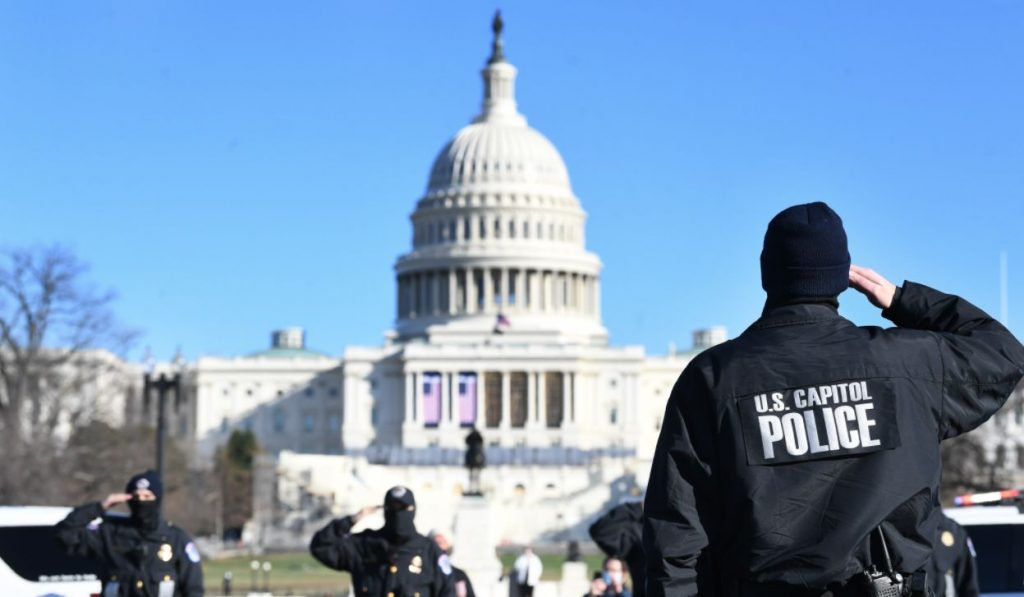() The United States Capitol Police (USCP) is opening up regional offices, prompting concerns that the police body acting outside of its jurisdiction and charter.
Related Confirmed: Undercover FBI Agents Were Among Capitol Rioters on January 6, Court Documents Reveal
by , July 7th, 2021
California and Florida will be the locations of the first two branch offices, with additional states expected to be added in the “near future.” Acting USCP Chief Yogananda Pittman made the announcement in a statement on Tuesday. The purpose will be “to investigate threats to Members of Congress” following the Capitol riots on January 6th.
“The USCP has enhanced our staffing within our Dignitary Protection Division as well as coordinated for enhanced security for Members of Congress outside of the National Capitol Region,” Pittman’s statement said. “The Department is also in the process of opening Regional Field Offices in California and Florida with additional regions in the near future to investigate threats to Members of Congress.”
The statement by Chief Pittmann details the bases for the Capitol Police’s action plan, which include recommendations of the “House Select Committee.” Speaker Pelosi, one of the principals who exerts authority over the Capitol Police, recently tapped a partisan 13-member House select committee to review the origins of the January 6th riots, which included only one Republican: Rep. Liz Cheney.
“USCP continues to implement recommendations from a series of post January 6 reviews including”:
- Examining the U.S. Capitol Attack, a report by the U.S. Senate Committee on Homeland Security & Government Affairs and the U.S. Senate Committee on Rules
- Capitol Security Review, a report conducted by Lt. Gen. Russel Honoré’s Task Force 1-6
- A series of flash reports by the USCP Office of the Inspector General
- Government Accountability Office
- Architect of the Capitol’s Physical Security Assessment
- USCP Security Services Bureau’s Complex Security Assessments
- House Select Committee
The issue with the Capitol Police opening branches around the United States is that the agency is exempt from normal mechanisms of public accountability. It essentially acts as the U.S. Congress’s staff of bodyguards. A June 2020 article in Roll Call about the Capitol Police’s ‘secrecy’ is relevant.
“Democrats and Republicans in Congress have called for an overhaul of law enforcement practices following the police killing of George Floyd, but those same lawmakers who want accountability and transparency nationwide aren’t taking a stance on whether their own department, the Capitol Police, should be subject to the Freedom of Information Act,” the report said. “As a part of the legislative branch, the department remains exempt from the law.”
“Despite the public outcry for more transparency, none of the lawmakers who serve on committees whose jurisdiction includes the Capitol Police said the force charged with protecting and securing Congress should be subject to the 1966 Freedom of Information Act that requires federal agencies to disclose a large amount of government information to the public,” the report added.
“Congress is not subject to the law, and the Capitol Police, as a component of the legislative branch, is also exempt from any FOIA request,” it added.
Such is the reality for a police agency whose officer fatally shot a Trump supporter named Ashli Babbitt on January 6th and escaped all public accountability. The Department of Justice not only dropped the charges, but announced that charges would not be filed.
This same unaccountable Capitol Police force is now opening up branch offices nationwide. The legal basis for how such a police force could operate within the jurisdiction of state laws is unclear. Governor Ron DeSantis’s explanation of the development, in particular, bears watching.
Organic Lion’s Mane Mushroom, proven to grow new brain cells and synapses. Guard against Alzheimer’s, dementia, and mental decline. Save 10% and get free shipping with a subscription!“I can feel my mind getting sharper with Lion’s Mane. I put it in my coffee.”
Get your Lion’s Mane from Ascent Nutrition, one of the most pure and potent in the industry.
Stillness in the Storm Editor: Why did we post this?
The news is important to all people because it is where we come to know new things about the world, which leads to the development of more life goals that lead to life wisdom. The news also serves as a social connection tool, as we tend to relate to those who know about and believe the things we do. With the power of an open truth-seeking mind in hand, the individual can grow wise and the collective can prosper.
– Justin
Not sure how to make sense of this? Want to learn how to discern like a pro? Read this essential guide to discernment, analysis of claims, and understanding the truth in a world of deception: 4 Key Steps of Discernment – Advanced Truth-Seeking Tools.
Stillness in the Storm Editor’s note: Did you find a spelling error or grammatical mistake? Send an email to [email protected], with the error and suggested correction, along with the headline and url. Do you think this article needs an update? Or do you just have some feedback? Send us an email at [email protected]. Thank you for reading.
Source:
Support our work! (Avoid Big Tech PayPal and Patreon)DIRECT DONATION


Leave a Reply